On Friday we comb through our extensive archives to find an older article that we feel deserves another look. From June 19, 2013, Dungeon’s Master once again presents: Should the DM Use a Screen?
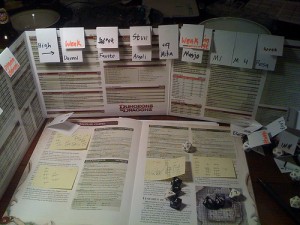
The DM’s screen – the great barrier that separates the DM from the players. Behind the screen the DM can do whatever he pleases. Personally I detest the DM’s screen. It forms a literal barrier that divides the table and cuts the DM off from the rest of the group. I feel that the screen only serves to perpetuate the incorrect belief that it’s the DM vs. the players. The screen denotes exclusivity and secrecy and in my vast gaming experiences it often gives the DM a false sense of self-worth, self-importance and power over the rest of the table.
Obviously the DM’s role in the game is different from that of the players. Yes, the DM has more to do, and controls all of the monsters, and decides on how things in the world play out, so I understand why some DMs get drunk with power. But there’s a simple way to level the playing field and bridge any ill will between the DM and players, and that’s to stop using the screen all together. I realize this may be scary for some DMs, so we’ll look at the most common reasons for using a screen and review the pros and cons of each.
Secrecy
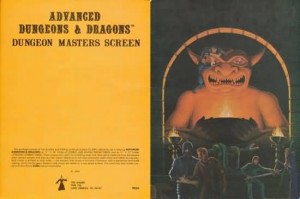 Despite my dislike for the DM’s screen, it can be a useful tool and does have a place at the gaming table if you want it to. The most obvious reason to use the screen is secrecy. If you need to have something in front of you as the DM, but you don’t want the players to see what that something is, use the screen. Typically this would include monsters the PCs haven’t yet encounters, or maps with traps and secret doors clearly marked.
Despite my dislike for the DM’s screen, it can be a useful tool and does have a place at the gaming table if you want it to. The most obvious reason to use the screen is secrecy. If you need to have something in front of you as the DM, but you don’t want the players to see what that something is, use the screen. Typically this would include monsters the PCs haven’t yet encounters, or maps with traps and secret doors clearly marked.
If you’re a DM who chooses not to use a screen you need to be mindful of wandering eyes. If you keep a copy of the master map in plain view of the players sitting next to you, then expect them to look for the secret doors in the correct places. If you have the Monster Manual open to the page you need, expect the players who can see the Rust Monster’s picture to caution the PCs wearing metal to stay back. The simplest way to avoid these problem is to keep things covered or out of sight until needed. Alternatively, one way I’ve messed with players who steal glances at my notes is to plant a few red herrings on the map or leave the books open to monsters they will never fight. They learn quickly not to trust what they see and eventually stop looking.
Another reason for secrecy, especially for less experienced DMs is to keep theGaming Jerks from telling you what to do or what you’re doing wrong. For example, when I use minions I like to roll for their damage rather than use a set number. Players know monsters that always do the same damage are likely minions and treat them as such. By rolling damage I keep the players on their toes for a few rounds. However, I once ran an FLR adventure where a player who could see the stat block for the minions literally reached over, pointed at the monsters’ set damage, announced to the table that the monsters were minions, explained to me that they should only be doing 6 damage each, and then told me that I wasn’t running them correctly. I politely told the player that my changes were intentional and I continued doing what I was doing despite his gross violation of the D&D social contract. Had I been a less experienced or less confident DM this could really have shaken me up. This is a problem that would have been totally avoidable had I been using a screen.
Separating player knowledge from character knowledge
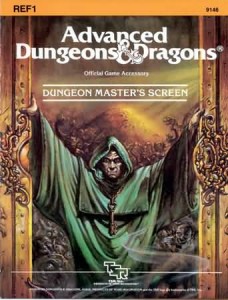 This is the only reason that I advocate using a screen. Sometimes players have a difficult time accepting that their characters are unaware of something that they as players know with absolute certainty. For example, a player decides that his Rogue is going to search the chest for traps before opening it. Let’s say he rolls a 2 and the DM tells him there are no traps. Immediately the other characters say they want to check it as well. Had the Rogue rolled a natural 20 and been told there were no traps no one else would have bothered checking. After all this is the Rogue’s area of expertise, if he says there are no traps there must not be any traps. But because the players saw the roll they behave differently. I’ve also seen this happen in social situations when poor Diplomacy checks are made or in dungeons when the party is searching to find secret doors. If the DM made these rolls secretly on behalf of the PC the players would have to decide if they accept a failure as a poor roll or a result of circumstances. If the party agrees to let the DM do secret check for them then I wholehearted endorse the use of a screen for this purpose.
This is the only reason that I advocate using a screen. Sometimes players have a difficult time accepting that their characters are unaware of something that they as players know with absolute certainty. For example, a player decides that his Rogue is going to search the chest for traps before opening it. Let’s say he rolls a 2 and the DM tells him there are no traps. Immediately the other characters say they want to check it as well. Had the Rogue rolled a natural 20 and been told there were no traps no one else would have bothered checking. After all this is the Rogue’s area of expertise, if he says there are no traps there must not be any traps. But because the players saw the roll they behave differently. I’ve also seen this happen in social situations when poor Diplomacy checks are made or in dungeons when the party is searching to find secret doors. If the DM made these rolls secretly on behalf of the PC the players would have to decide if they accept a failure as a poor roll or a result of circumstances. If the party agrees to let the DM do secret check for them then I wholehearted endorse the use of a screen for this purpose.
Quick reference
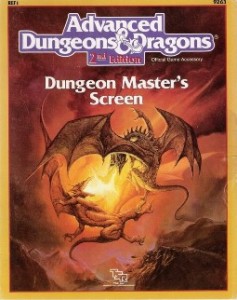 Most iterations of the DM’s screen are more than just a gatefold piece of cardboard; on the side facing the DM there are usually quick reference charts. The information included on the screen tends to be things that come into play frequently, but not frequently enough that you’re likely to have it memorized. Usually it’s charts or details that scale with level. These are certainly helpful, especially for rookie DMs, but all of these details are available in other sources.
Most iterations of the DM’s screen are more than just a gatefold piece of cardboard; on the side facing the DM there are usually quick reference charts. The information included on the screen tends to be things that come into play frequently, but not frequently enough that you’re likely to have it memorized. Usually it’s charts or details that scale with level. These are certainly helpful, especially for rookie DMs, but all of these details are available in other sources.
If this is the only reason you’re using a screen, I’d suggest marking the pages of your Rules Compendium or DMG with tabs so you can find them quickly when you need them thereby eliminating the need for a screen. In my experience, the players are often just as good a resource as the charts on the screen. If I’m not sure of something I can ask the player and usually someone knows the correct ruling. Alternatively as the DM I can and often do, just go with my gut and make a call on the fly.
Rolling

 I’m a big believer that all dice rolling should be done in plain sight in front of everyone. After all, for me at least, rolling the dice is one of the most exciting parts of the game. Whether I’m rolling to hit or it’s the DM rolling to hit me, the thrill of seeing that d20 roll and eventually stop on a number that will spell success or failure thrills me. When I’m a player and I roll a natural 20 I cheer. I also cheer whenever someone else rolls a natural 20. It’s usually a big deal when it happens so I like to treat it as such. As the DM my reaction is the exact opposite. My goal isn’t to kill the PCs, so when I roll a 20 I usually cringe and make a face of disgust because I know a PC is about to get raked over the coals.
I’m a big believer that all dice rolling should be done in plain sight in front of everyone. After all, for me at least, rolling the dice is one of the most exciting parts of the game. Whether I’m rolling to hit or it’s the DM rolling to hit me, the thrill of seeing that d20 roll and eventually stop on a number that will spell success or failure thrills me. When I’m a player and I roll a natural 20 I cheer. I also cheer whenever someone else rolls a natural 20. It’s usually a big deal when it happens so I like to treat it as such. As the DM my reaction is the exact opposite. My goal isn’t to kill the PCs, so when I roll a 20 I usually cringe and make a face of disgust because I know a PC is about to get raked over the coals.
Rolling behind the screen breeds distrust. Players will often wonder if you’re being honest about the results. This is especially true when the dice get really hot or really cold. Most players don’t want to be coddled; they want the dice to determine the course of the events good or bad. If the DM is fudging numbers the players feel cheated. By rolling in plain sight there’s never any doubt. I’ve seen many DMs use the screen but do all rolling in front of the party. This is a reasonable compromise that I’m ok with.
When it comes to rolling damage I’m less invested. If it’s a hit I don’t care if the damage dice are rolled in front of me or not. As a DM I will often pre-roll damage to make things run faster, and I often encourage players to do the same. In my mind the hit that matters more than the damage.
If you’re a DM who does roll behind the screen then take advantage of it. If the party is getting absolutely destroyed, consider fudging the numbers a bit. I now I already said I like the dice to fall where they may, but a good DM knows that from time to time the party will need some help. I’m not saying all the time, but there will be rare occasions when you know that if things keep going the way they’re going it will be a TPK. In these cases switch to a smaller damage die, or cut the number you roll in half. If you’re rolling in the open this is a lot harder to do and not be noticed, but if you’re behind the screen you can throw the PCs a bone every now and then.
To screen or not to screen?
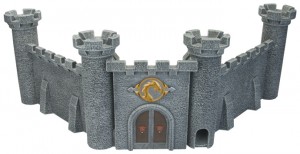 In my opinion DMs should not use the screen. Although there are a few good reasons why you may want to use it, in my mind the reasons for not using it far outweigh the reasons for using it. Anything that separates the DM from the players is bad for the game. The gaming experience should be one of inclusion and shared story-telling. By using the screen you immediately create physical division and a feeling of taking sides. By foregoing the screen and embracing the group dynamic, you’ll likely find that you have a more positive gaming experience and that it’s less likely to create and atmosphere of players vs. DM.
In my opinion DMs should not use the screen. Although there are a few good reasons why you may want to use it, in my mind the reasons for not using it far outweigh the reasons for using it. Anything that separates the DM from the players is bad for the game. The gaming experience should be one of inclusion and shared story-telling. By using the screen you immediately create physical division and a feeling of taking sides. By foregoing the screen and embracing the group dynamic, you’ll likely find that you have a more positive gaming experience and that it’s less likely to create and atmosphere of players vs. DM.
Do you use the screen? What other pros and cons can you add to this discussion? What do you feel are the best and worst reasons for using a screen? What game do you think has the best screen?
[jetpack_subscription_form title=”Looking for Instant Updates?” subscribe_text=”Subscribe to the Dungeon’s Master Feed for up to date info from your favourite D&D site.” subscribe_button=”Sign Up Now”]
9 replies on “Friday Favourite: Should the DM Use a Screen?”
I do use a screen, but I roll my dice in plain view.
I find hiding the adventure module to be really really important with my group (which contains some younger wandering eyes).
Also, I like using cardboard character tabs to track initiative. And I tend to clip pictures (mmonsters, npcs, towns) to the screen for the party to see.
Here’s the compromise that I came up with. When I am just role playing, getting the players to the next encounter etc. I keep the screen up. Then when combat starts I drop the screen to encourage a more free flowing combat. And that really seems to be a happy medium.
it’s a big opinion to say “a screen should or shouldn’t be used”, and really, just an opinion.
I find it very useful to keep my minis and maps hidden as mentioned in the article.
But regardless of the screen I always roll in view of the players so they know there is no fudging nor favoritism.
Very occasionally I do ask players to roll into a dice tower I made that drops the die into the screen so they can’t see the result (inspired by Fantasy Ground’s tower that’s used for the same purpose, so they can’t measure the degree of success/failure of a skill roll such as disarming a trap) and that’s a key I’ve found: I’ve let them roll their own dice instead of me rolling for them, even if they don’t know the result, they feel they’ve had they’re own luck (instead of mine through my rolling or my dice) directly involved.
The way I see it, the screen is irrelevant as long as you roll in front of your players for the rolls that matter
I rarely use a big screen. I will sometimes setup a short screen of 2″ acrylic rods to sheild hidden dice rolls from overeager eyes. Mostly I just continually roll my 2 D20s in plain sight. The players never know if I am rolling for an event or if just making noise and they never know which die is the active one.
I play sitting down. I like the collegial atmosphere created when playing without a screen plus I can see where the players are moving their minis without having to move.
The 2″ screen is the most I want between myself and the table.
I would say that it depends on what I’m running and where I’m running a game, but in general, if there are a number of tables for the game or rules I need to reference, I prefer a screen to a reference sheet as it’s easier to look at quickly.
When I don’t use a screen, I feel more disorganized and keep trying to remember to keep my notes hidden from view. It’s more of a distraction for me when I don’t have one.
Also, if I am using minis and maps, I prefer being able to conceal them behind a screen. In any case, I always roll in front of the players.
So, although I don’t always use one, I would have to say I prefer having a screen.
The DMs I have right now use the screen on and off, and I think that is a good compromise. I do feel that somethings needs to be kept secret and for those instances a screen must be used. It could be that they have to have a specific book out for a cool monster that no one has heard of, and it prevents curious players from seeing it and then looking it up. Screens also have useful information about skills on them. With a screen, a DM can “fudge” rolls, if needed, when the party runs into a span of terrible luck (I have terrible luck in most sessions). However, when all the cards have been laid bare, I prefer the DM to lose the screen. It brings the DM closer to the players and I really like that. However, when push comes to shove, if the DM wants a screen then they can use a screen.
I always use a screen. I have at times not used a screen, but I always prefer using one. I find that you trade one issue for another whether or not you are using a screen. On one hand players may get suspicious of your rolls, but if you don’t use a screen, all eyes are on your rolls, and that is not always a good thing (nor is it always a bad thing).
Overall however, I’ve always preferred using a screen as a DM, and as a player I have always preferred that the DM use a screen as well. If I can see the rolls, and the notes, I will try not to look, but it is very difficult not to. I find that I am always distracted by that, and have a feeling of “peeking behind the curtain” and ruining the magic. I feel that having the screen is a good way to suspend disbelief and feel like you are playing in a living world.
I also think it is important to differentiate the DM from the players as well. The DM is the arbiter and adjudicator of the world. I expect that the DM has his/her adequate tools at the ready, and that (in my opinion) would necessitate the need for a DM Screen. I don’t think it removes the DM from the game, but there is most certainly a different role that the DM plays compared to the players whether there is a screen there or not.
In my experience I have not had many issues using a screen, as my rulings are always fair for the game and in the name of fun ultimately. I find this is how you develop trust with your players, not based on the presence of a screen or not. I have played at tables where the DM was not using a screen and the us vs. the DM attitude was in full force. I think it all comes down to the group you are playing with.
I do see the excitement over a tense roll though and will often bring that out from behind the screen if the mood calls for it. For example a monster making a saving throw after the party wizard casts a desperate last spell to neutralize a deadly threat. In the end however, I personally feel too much is sacrificed without the screen. In my opinion the Screen is not only a great utility for the DM, but also acts as a way for players to focus on the story and not the mechanics all the time.
In the end of course it all comes down to personal preference for each DM.
Each DM has to find his own niche. I use a screen on a side table for secrecy. I also DO NOT roll in front of my players. My job is to make the adventure fun and challenging. Bad dice rolls or good dice rolls should not change that. I have my monsters “fumble” when it’s needed regardless of the dice rolls and “critical” when it is needed as well. Rolling in front of the players limits me to exactly what the dice rolls. The troll who attacks the wizard for instance rolls 3 20’s for his claw, claw, bite. If I had thrown this roll in front of the players the wizard is ripped to pieces. If done in secrecy I can decide he only hit once. For this reason alone the screen is a great benefit. If something as trivial as the screen separates me from my players then the problem is more likely bigger than a 4″ piece of cardboard.
[…] I always thought they were cool. It set me apart as a GM. However, that may not be a good idea. Here’s a cool article on the question: Should the DM Use a Screen? […]